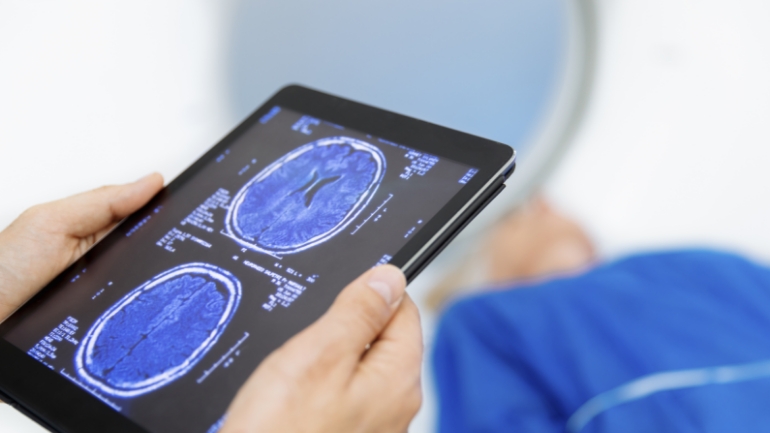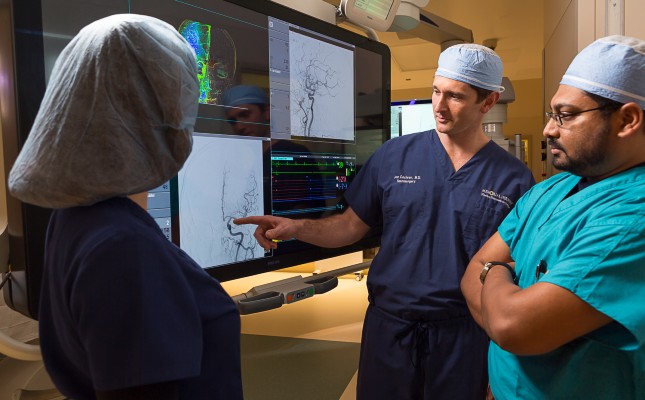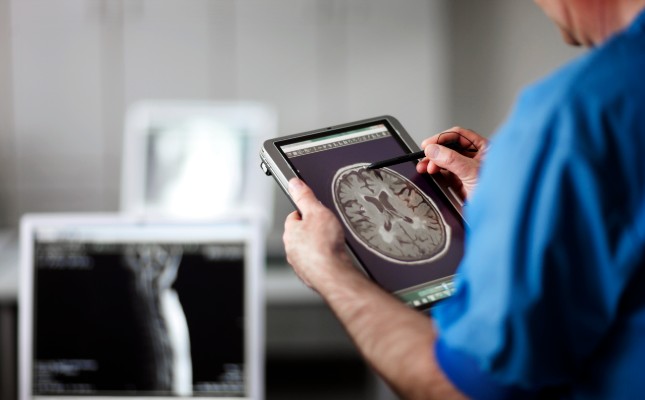AI Platform Dramatically Accelerates Treatment Times and Improves Patient Outcomes
Memorial Hermann recently implemented Viz.ai, an artificial intelligence (AI)-driven software platform for improving and expediting care for stroke patients. The systemwide rollout began in April 2021 at the Comprehensive Stroke Center at Memorial Hermann Memorial City Medical Center. The Viz.ai system is now fully operational across the entire Memorial Hermann Health System, making Memorial Hermann the largest user of AI-enabled technology for stroke care in the Houston area.
Viz.ai describes their platform as “AI-powered intelligent care coordination” and says it enables health systems to “connect multidisciplinary care teams earlier, coordinate care and improve outcomes for patients.” Memorial Hermann is using the technology to help its stroke teams quickly identify individuals who have suffered a large vessel occlusion (LVO) stroke and expedite treatment.
Early Results: 15% Faster Treatments, 30% Better Outcomes
Although Memorial Hermann’s use of the technology is relatively new, it has already delivered impressive results. “In just 7 months, use of the Viz.ai platform has already enabled our stroke teams at three of our campuses to reduce our time to definitive treatment by 15% and improve our discharge to home (versus to nursing home/rehab hospital/death) rates by 30%,” says affiliated vascular and interventional neurologist Sunil Sheth, MD, UTHealth Neurosciences physician and associate professor and director of the Vascular Neurology Program at McGovern Medical School at UTHealth Houston.
Dr. Sheth was instrumental in bringing Viz.ai to Memorial Hermann and has been involved in the project from conception through funding, planning and implementation. “Several years ago, we began looking at how we could expand the reach of treatments we’re developing in our academic, high-volume urban centers into the community. Strokes happen everywhere. We wanted to expand access to this knowledge and these lifesaving treatments to patients outside of these high-volume centers,” says Dr. Sheth.
Since 2015, stroke teams at Memorial Hermann have been treating LVO strokes with minimally invasive procedures using catheters to remove clots and restore blood flow. “These are incredibly impactful interventions,” says Dr. Sheth. “We have the capability to treat these patients, but the challenge has been how to quickly identify and get them to treatment. Viz.ai helps us do both.”
Automatically Detects LVO
Upon arrival at any Memorial Hermann facility that receives stroke patients—including all Memorial Hermann hospitals, the emergency rooms at Memorial Hermann Convenient Care Centers and the Memorial Hermann Mobile Stroke Unit—the patient is imaged, and the CT or CT angiogram is instantly uploaded into the Viz.ai system. Within minutes, using AI, the system automatically evaluates the image to detect the presence of an LVO.
“It’s the equivalent of having a very experienced neuroradiologist staring at the screen, watching all of the images the minute they come up and making that determination,” says Dr. Sheth.
Notifies Patient's Care Team
If an LVO is detected, the system immediately sends a simultaneous alert to the smartphone of everyone involved in the patient’s care—stroke neurologists, interventionalists, residents and fellows, procedural technicians and nurses, and stroke coordinators—at the initial facility and at the Memorial Hermann facility to which the patient would be transferred. (If an LVO stroke patient was imaged at Memorial Hermann Katy Hospital, for instance, an alert would be sent to the stroke teams at Memorial Hermann Katy and Memorial Hermann Memorial City.) This notification, coupled with the system’s chat function, enables the team members to instantly communicate and prepare to receive the patient.
Comprehensive Stroke Centers
Four hospitals in Memorial Hermann Health System have been designated as Comprehensive Stroke Centers (CSCs), the highest number of CSC-designated hospitals within a single health system in Houston. CSC status is the highest level of care of all stroke certifications.
They are: Memorial Hermann-Texas Medical Center, Memorial Hermann Memorial City Medical Center, Memorial Hermann The Woodlands Medical Center and Memorial Hermann Southwest Hospital.
These four hospitals serve as the system’s stroke referral hubs and receive transfers from other hospitals, including Primary Stroke Centers, from within and outside the Memorial Hermann Health System.
An Ongoing Commitment
Dr. Sheth says Memorial Hermann shares its EMS partners’ commitment to providing the best care to stroke patients throughout Greater Houston and Southeast Texas. “Our continued investment in new technologies, like Viz.ai and our team’s use of tele-neurology to speed response times to code strokes, should move us closer to providing every patient in the region with access to high-quality stroke care, and to accelerate that care.”
Red Duke Trauma Institute Newsletter Sign Up
Use the form below to sign up to receive our Red Duke Trauma Institute Newsletter with helpful articles about our services, case studies relevant to clinical protocols practiced on a daily basis, information about available educational opportunities and many other updates for healthcare professionals and first responders.



